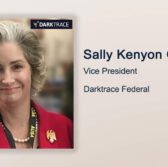Mark Flugge, an environmental consultant and atmospheric scientist, has been named sustainability and climate change lead at CGI Federal.
In his new advisory role, Flugge will collaborate with federal customers to develop policies that are responsive to climate change conditions, the Fairfax, Virginia-based CGI subsidiary said Tuesday.
With Flugge’s leadership, the company also hopes to reach net-zero carbon emissions by 2030.
“Dr. Flugge will serve as an integral link in bringing the company’s global expertise to our internal sustainability programs and to our clients,” commented Jay Hadley, senior vice president of consulting services for regulatory agencies at CGI.
Hadley also referenced Flugge’s “deep expertise” in sustainability. At CGI Federal, Flugge will leverage almost two decades of experience in counseling major government and private organizations such as the World Bank, the United Nations Framework Convention on Climate Change and the U.S. Agency for International Development.
The executive specializes in greenhouse gas emissions, climate change and biodiversity and he is frequently tasked with relaying information about productive climate policies and intricate data sets.
For nearly a decade, Flugge worked as a senior associate, technical specialist and manager at consulting and technology services firm ICF, where he oversaw low emission programs in Guatemala, Bangladesh and Thailand. While at ICF, he was also land use expert for the United Kingdom Foreign and Commonwealth Office’s Strategic Programme Fund monitoring net carbon emissions.
Flugge also spent time as a policy analyst for the Pew Center on Global Climate Change and acted as adviser to the Department of Agriculture and the U.S. Global Change Research Program.
He remarked there are many available pathways for the federal government to navigate a “more prepared, resilient and sustainable economy” through sustainability measures.
“I’m excited to join a team committed to delivering sustainability-focused counsel to clients across government and identifying pathways to net-zero, resource efficiency, supply chain responsibility, and social value,” Flugge concluded.





